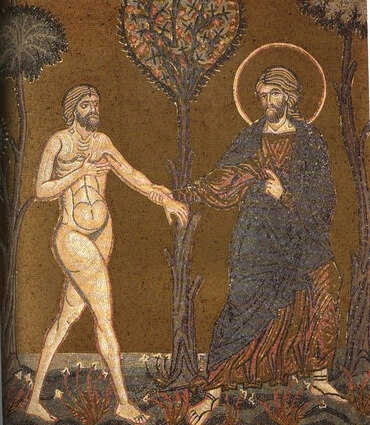1
യഹോവ മോശെയോടു കല്പിച്ചതുപോലെ അവര് നീലനൂല്, ധൂമ്രനൂല്, ചുവപ്പുനൂല് എന്നിവകൊണ്ടു വിശുദ്ധമന്ദിരത്തിലെ ശുശ്രൂഷെക്കായി വിശേഷവസ്ത്രവും അഹരോന്നു വിശുദ്ധവസ്ത്രവും ഉണ്ടാക്കി.
2
പൊന്നു, നീലനൂല്, ധൂമ്രനൂല്, ചുവപ്പുനൂല്, പിരിച്ച പഞ്ഞിനൂല് എന്നിവകൊണ്ടു ഏഫോദ് ഉണ്ടാക്കി.
3
നീലനൂല്, ധൂമ്രനൂല്, ചുവപ്പുനൂല്, പഞ്ഞിനൂല് എന്നിവയുടെ ഇടയില് ചിത്രപ്പണിയായി നെയ്യേണ്ടതിന്നു അവര് പൊന്നു അടിച്ചു നേരിയ തകിടാക്കി നൂലായി കണ്ടിച്ചു.
4
അവര് അതിന്നു തമ്മില് ഇണെച്ചിരിക്കുന്ന ചുമല്ക്കണ്ടങ്ങള് ഉണ്ടാക്കിഅതു രണ്ടു അറ്റത്തും ഇണെച്ചിരുന്നു.
5
അതു കെട്ടി മുറുക്കുവാന് അതിന്മേലുള്ളതായി ചിത്രപ്പണിയായ നടുക്കെട്ടു, യഹോവ മോശെയോടു കല്പിച്ചതുപോലെ അതില് നിന്നു തന്നേ, അതിന്റെ പണിപോലെ പൊന്നു, നീലനൂല്, ധൂമ്രനൂല്, ചുവപ്പുനൂല്, പിരിച്ച പഞ്ഞിനൂല് എന്നിവകൊണ്ടു ആയിരുന്നു.
6
മുദ്രക്കൊത്തായിട്ടു യിസ്രായേല്മക്കളുടെപേര് കൊത്തിയ ഗോമേദകക്കല്ലുകളെ അവര് പൊന്തടങ്ങളില് പതിച്ചു.
7
യഹോവ മോശെയോടു കല്പിച്ചതുപോലെ അവന് യിസ്രായേല്മക്കള്ക്കു വേണ്ടി ഏഫോദിന്റെ ചുമക്കണ്ടങ്ങളിന്മേല് ഔര്മ്മക്കല്ലുകള് വെച്ചു.
8
അവന് ഏഫോദിന്റെ പണിപോലെ ചിത്രപ്പണിയായിട്ടു പൊന്നു, നീലനൂല്, ധൂമ്രനൂല്, ചുവപ്പുനൂല്, പിരിച്ച പഞ്ഞിനൂല് എന്നിവകൊണ്ടു പതക്കവും ഉണ്ടാക്കി.
9
അതു സമചതുരമായിരുന്നു; പതക്കം ഇരട്ടയായി ഉണ്ടാക്കി; അതു ഒരു ചാണ് നീളവും ഒരു ചാണ് വീതിയും ഉള്ളതായി ഇരട്ട ആയിരന്നു.
10
അവര് അതില് നാലു നിര രത്നം പതിച്ചുതാമ്രമണി, പീതരത്നം, മരതകം; ഇതു ഒന്നാമത്തെ നിര.
11
രണ്ടാമത്തെ നിരമാണിക്യം, നിലക്കല്ലു, വജ്രം,
12
മൂന്നാമത്തെ നിരപത്മരാഗം, വൈഡൂര്യം, സുഗന്ധിക്കല്ലു.
13
നാലാമത്തെ നിരഗോമേദകം, പുഷ്പരാഗം, സൂര്യകാന്തം; അവ അതതു തടത്തില് പൊന്നില് പതിച്ചിരുന്നു.
14
ഈ കല്ലുകള് യിസ്രായേല്മക്കളുടെ പേരുകളോടുകൂടെ അവരുടെ പേര്പോലെ പന്ത്രണ്ടു ആയിരുന്നു; പന്ത്രണ്ടു ഗോത്രങ്ങളില് ഔരോന്നിന്റെ പേര് അവയില് മുദ്രക്കൊത്തായി കൊത്തിയിരുന്നു.
15
പതക്കത്തിന്നു ചരടുപോലെ മുറിച്ചുകുത്തുപണിയായി തങ്കംകൊണ്ടു സരപ്പളികളും ഉണ്ടാക്കി.
16
പൊന്നുകൊണ്ടു രണ്ടു വളയവും രണ്ടു കണ്ണിയും ഉണ്ടാക്കി; വളയം രണ്ടും പതക്കത്തിന്റെ രണ്ടു അറ്റത്തും വെച്ചു.
17
പൊന്നുകൊണ്ടുള്ള രണ്ടു സരപ്പളി അവര് പതക്കത്തിന്റെ അറ്റത്തു രണ്ടു വളയത്തിലും കൊളുത്തി.
18
രണ്ടു സരപ്പളിയുടെയും അറ്റം രണ്ടും അവര് കണ്ണി രണ്ടിലും കൊളുത്തി ഏഫോദിന്റെ ചുമല്ക്കണ്ടങ്ങളിന്മേല് മുന് ഭാഗത്തു വെച്ചു.
19
അവര് പൊന്നു കൊണ്ടു വേറെ രണ്ടു കണ്ണി ഉണ്ടാക്കി പതക്കത്തിന്റെ മറ്റെ രണ്ടു അറ്റത്തും ഏഫോദിന്റെ കീഴറ്റത്തിന്നു നേരെ അകത്തെ വിളുമ്പില് വെച്ചു.
20
അവര് വേറെ രണ്ടു പൊന് കണ്ണി ഉണ്ടാക്കി ഏഫോദിന്റെ മുന് ഭാഗത്തു രണ്ടു ചുമല്ക്കണ്ടങ്ങളില് താഴെ അതിന്റെ ഇണെപ്പിന്നരികെ എഫോദിന്റെ നടുക്കെട്ടിന്നു മേലായി വെച്ചു.
21
പതക്കം ഏഫോദിന്റെ നടുക്കെട്ടിന്നു മേലായി ഇരിക്കേണ്ടതിന്നും അതു ഏഫോദില് ആടാതിരിക്കേണ്ടതിന്നും ദൈവം മോശെയോടു കല്പിച്ചതുപോലെ അവര് അതു കണ്ണികളാല് ഏഫോദിന്റെ കണ്ണികളോടു നീലനാടകൊണ്ടു കെട്ടി.
22
അവന് ഏഫോദിന്റെ അങ്കി മുഴുവനും നീലനൂല്കൊണ്ടു നെയ്ത്തുപണിയായി ഉണ്ടാക്കി.
23
അങ്കിയുടെ നടുവില് കവചത്തിന്റെ ദ്വാരംപോലെ ഒരു ദ്വാരവും അതു കീറാതിരിക്കേണ്ടതിന്നു ചുറ്റും ഒരു നാടയും വെച്ചു.
24
അങ്കിയുടെ വിളുമ്പില് നീലനൂല് ധൂമ്രനൂല്, ചുവപ്പുനൂല്, പിരിച്ച പഞ്ഞിനൂല്, എന്നിവ കൊണ്ടു മാതളപ്പഴങ്ങള് ഉണ്ടാക്കി.
25
തങ്കം കൊണ്ടു മണികളും ഉണ്ടാക്കി; മണികള് അങ്കിയുടെ വിളുമ്പില് ചുറ്റും മാതളപ്പഴങ്ങളുടെ ഇടയില് വെച്ചു.
26
ശുശ്രൂഷെക്കുള്ള അങ്കിയുടെ വിളുമ്പില് ചുറ്റും ഒരു മണിയും ഒരു മാതളപ്പഴവും ഒരു മണിയും ഒരു മാതളപ്പഴവും ഇങ്ങനെ യഹോവ മോശെയോടു കല്പിച്ചതുപോലെ തന്നേ വെച്ചു.
27
അഹരോന്നും പുത്രന്മാര്ക്കും പഞ്ഞിനൂല്കൊണ്ടു നെയ്ത്തുപണിയായ അങ്കിയും
28
പഞ്ഞിനൂല്കൊണ്ടു മുടിയും പഞ്ഞിനൂല്കൊണ്ടു അലങ്കാരമുള്ള തലപ്പാവും പിരിച്ച പഞ്ഞിനൂല്കൊണ്ടു കാല്ച്ചട്ടയും
29
പിരിച്ച പഞ്ഞിനൂല്, നീലനൂല്, ധൂമ്രനൂല്, ചുവപ്പുനൂല് എന്നിവ കൊണ്ടു ചിത്രത്തയ്യല്പണിയായ നടുക്കെട്ടും യഹോവ മോശെയോടു കല്പിച്ചതുപോലെ തന്നേ ഉണ്ടാക്കി.
30
അവര് തങ്കംകൊണ്ടു വിശുദ്ധമുടിയുടെ നെറ്റിപ്പട്ടം ഉണ്ടാക്കി, അതില് “യഹോവേക്കു വിശുദ്ധം” എന്നു മുദ്രക്കൊത്തായുള്ള ഒരു എഴുത്തു കൊത്തി.
31
അതു മുടിമേല് കെട്ടേണ്ടതിന്നു അതില് നീലനൂല്നാട കോര്ത്തുയഹോവ മോശെയോടു കല്പിച്ചതുപോലെ തന്നേ.
32
ഇങ്ങനെ സമാഗമനക്കുടാരമെന്ന തിരുനിവാസത്തിന്റെ പണി ഒക്കെയും തീര്ന്നു; യഹോവ മോശെയോടു കല്പിച്ചതു പോലെ ഒക്കെയും യിസ്രായേല്മക്കള് ചെയ്തു. അങ്ങനെ തന്നേ അവര് ചെയ്തു.
33
അവര് തിരുനിവാസം മോശെയുടെ അടുക്കല് കൊണ്ടുവന്നു; കൂടാരവും അതിന്റെ ഉപകരണങ്ങളൊക്കെയും കൊളുത്തു, പലക,
34
അന്താഴം, തൂണ്, ചുവടു, ചുവപ്പിച്ച ആട്ടുകൊറ്റന്തോല്കൊണ്ടുള്ള പുറമൂടി, തഹശൂതോല്കൊണ്ടുള്ള പുറമൂടി, മറയുടെ തിരശ്ശീല,
35
സാക്ഷ്യപെട്ടകം, അതിന്റെ തണ്ടു,
36
കൃപാസനം, മേശ, അതിന്റെ ഉപകരണങ്ങളൊക്കെയും,
37
കാഴ്ചയപ്പം, തങ്കംകൊണ്ടുള്ള നിലവിളകൂ, കത്തിച്ചുവെപ്പാനുള്ള ദീപങ്ങള്, അതിന്റെ ഉപകരണങ്ങളൊക്കെയും,
38
വെളിച്ചത്തിന്നു എണ്ണ, പൊന്നുകൊണ്ടുള്ള ധൂപപീഠം, അഭിഷേകതൈലം, സുഗന്ധ ധൂപവര്ഗ്ഗം, കൂടാരവാതിലിന്നുള്ള മറശ്ശീല,
39
താമ്രംകൊണ്ടുള്ള യാഗപീഠം, അതിന്റെ താമ്രജാലം, തണ്ടു, അതിന്റെ ഉപകരണങ്ങളൊക്കെയും, തൊട്ടി, അതിന്റെ കാല്,
40
പ്രാകാരത്തിന്റെ മറശ്ശീല, തൂണ്, അതിന്റെ ചുവടു, പ്രാകാരവാതിലിന്റെ മറശ്ശീല, അതിന്റെ കയറു, കുറ്റി, സമാഗമനക്കുടാരമെന്ന തിരുനിവാസത്തിലെ ശുശ്രൂഷെക്കുള്ള ഉപകരണങ്ങളൊക്കെയും,
41
വിശുദ്ധമന്ദിരത്തിലെ ശുശ്രൂഷെക്കായി വിശേഷവസ്ത്രം, പുരോഹിതശുശ്രൂഷെക്കുള്ള അഹരോന്റെ വിശുദ്ധവസ്ത്രം, അവന്റെ പുത്രന്മാരുടെ വസ്ത്രം
42
ഇങ്ങനെ യഹോവ മോശെയോടു കല്പിച്ചതുപോലെ ഒക്കെയും യിസ്രായേല്മക്കള് എല്ലാപണിയും തീര്ത്തു.
43
മോശെ പണി ഒക്കെയും നോക്കി, യഹോവ കല്പിച്ചതുപോലെ തന്നേ അവര് അതു ചെയ്തു തീര്ത്തിരുന്നു എന്നു കണ്ടു മോശെ അവരെ അനുഗ്രഹിച്ചു.







